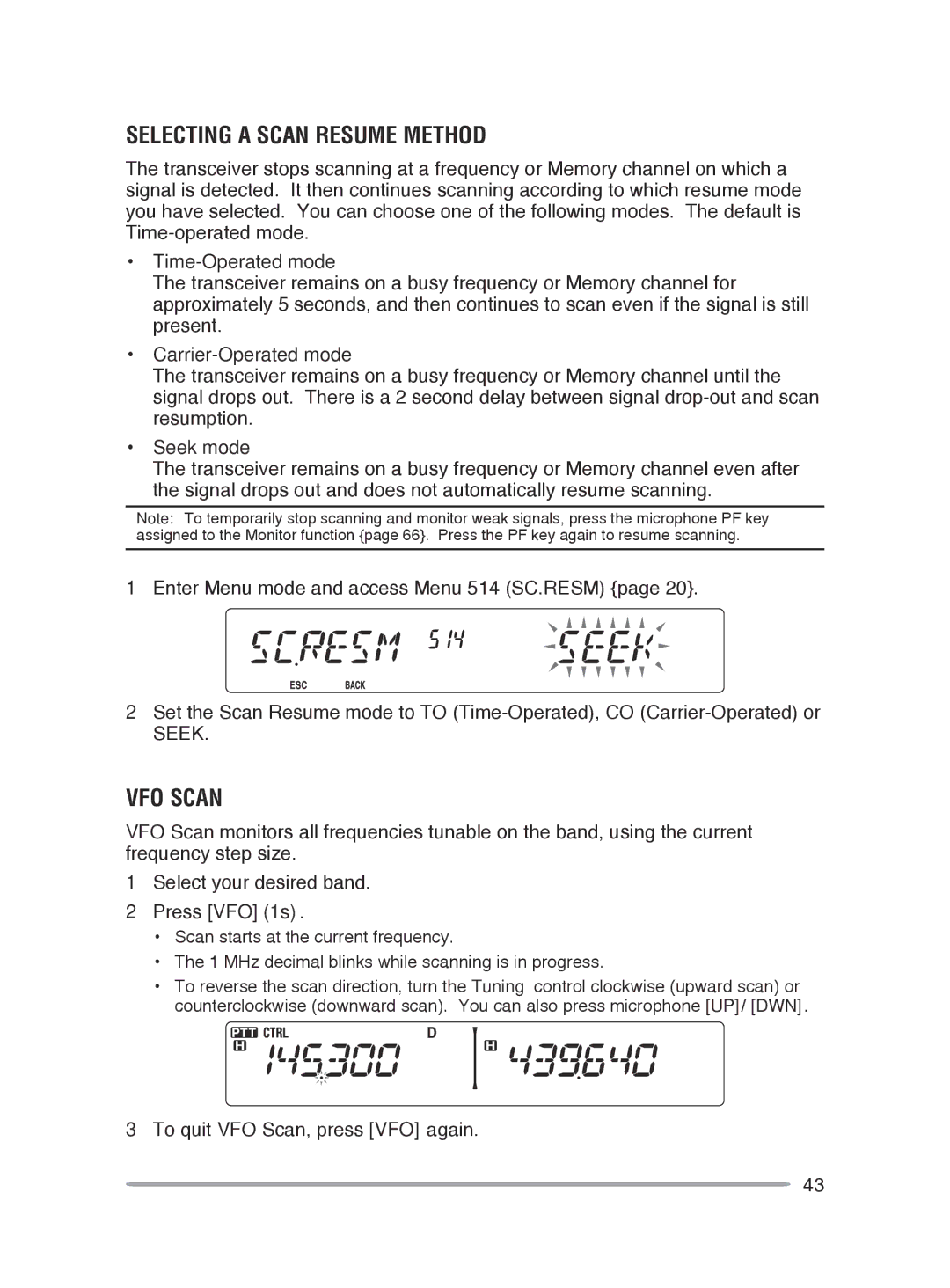144/430 MHz FM Dual Bander
144/440 MHz FM Dual Bander
Writing Conventions Followed in this Manual
Features
This transceiver has the following main features
Thank You
One or more of the following statements may be applicable
When Condensation Occurs Inside the Transceiver
Precautions
Contents
Using Ctcss Ctcss Frequency ID
Using DCS DCS Code ID
Manual Dialing Automatic dialer
VGS-1 Optional Voice Guide & Storage Unit
Dtmf Key Lock
Options
Part Number Quantity
Supplied Accessories
Mobile Installation
Preparation
Mobile Operation
Power Cable Connection
Fixed Station Operation
Fuse Location Fuse Current Rating
Located on the DC connector
Supplied DC power cable
Replacing Fuses
Antenna Connection
Front Panel Orientation
Accessory Connections
External Speakers
Microphone
Front Panel
Getting Acquainted
0PF2
REV
LOW
PF1
Display
Indicator Description
Appears while accessing the Menu
Sub-Panel
Rear Panel
Microphone MC-59
Press the switch again to switch the transceiver OFF
Switching the Power ON/ OFF
Adjusting the Volume
Press the switch to switch the transceiver on
Adjusting the Squelch
Selecting a Band
Band a left Band SEL control Band B right Band SEL control
Selecting Dual band mode/ single band Mode
Frequency ranges
Selecting a frequency band
Selecting an Operating mode
VFO Mode
Memory Channel Mode
Transmitting
Call Channel Mode
Press Call to enter Call Channel mode
When you finish speaking, release the PTT switch
Press F, Tuning control to access the Menu
Menu Mode
Menu Access
Menu Configuration
ANN.SPD
DT.SPD
MIC.LCK
Repeat steps 2 and 3 to enter the remaining characters
Rotate the Tuning control to select your desired character
Press the Tuning control to set the selected character
Character Entry
Key Character Display with each press of the key
Microphone Keypad Character Entry
Repeater Access
Operating Through Repeaters
Selecting an Offset Direction
Activating the Tone Function
Selecting an Offset Frequency
Frequency
Rotate the Tuning control to select your desired frequency
Selecting a Tone Frequency
Press F, Tone
Automatic Repeater Offset K and E Types Only
Transmitting a 1750 Hz Tone
Reverse Function
Automatic Simplex Checker ASC
Press F, Tone 1s to run the Tone Frequency ID scan
Tone Frequency ID
Memory Channels
Simplex & Repeater or ODD-SPLIT Memory CHANNEL?
Parameter Simplex Odd-split
Storing Simplex and Standard Repeater Frequencies
Storing Odd-Split Repeater Frequencies
Call Channel Memory Simplex
Recalling a Memory Channel
Call Channel Memory Odd-Split
Memory Recall Method
Clearing a Memory Channel
Turn the transceiver power OFF
Press MR + Power on
Press the Tuning control to clear the Memory channel
Press F, VFO
Switching the Memory Name/ Frequency Display
Memory-TO-VFO TRansfer
Channel Display FUnction
KEY KEY 1s While KEY +
Key Name
Programmable Memory PM
Application Examples
Storing Data in PM Channels
Recalling PM Channels
Press F, PM
Auto PM Channel store
PM Channel Reset
Press F + Power on
Press the Tuning control again to reset the PM channels
Scan Type Scan Range
Scan
VFO Scan
Selecting a Scan Resume Method
To quit Memory Scan, press MR again
Memory Scan
Locking Out a Memory Channel
Press MR 1s
Memory Group Channel Range
To quit Group Scan, press the Tuning control again
Group Scan
Memory Group Link
Setting Scan Limits
Program Scan
Press VFO
To quit Program Scan, press VFO again
Using Program Scan
To quit Call Scan, press Call again
To quit MHz Scan, press the Tuning control again
MHz Scan
Call Scan
Continuous Tone Coded Squelch System Ctcss
Using Ctcss
Press Enter again to complete the setting
Press F, Tone 1s
Ctcss FREQuency ID
Using DCS
Rotate the Tuning control to select your desired DCS code
Digital Coded Squelch DCS
DCS Code
DCS Code ID
1209 1336 1447 1633 697 770 852 941
Dual Tone MULTI-FREQUENCY Dtmf
Manual Dialing
Dtmf Hold
Storing a Dtmf Code in Memory
Automatic Dialer
Selecting a Transmit Speed
Transmitting Stored Dtmf Codes
Selecting a Pause Duration
Dtmf Key Lock
Storing EchoLink memory
What is EchoLink?
Transmitting EchoLink Memory
TxD RxD
Setting Up EchoLink Sysop Mode
EchoLink Sysop Mode on TM-V71
EchoLink Sysop Mode OFF TM-V71
Auto Display Brightness
POWER-ON Message
Auxiliary Functions
Display Brightness
To turn Key Lock on or OFF, press F 1s
Key Lock
Backlight Color
Microphone Key Lock
Beep Volume
Key Beep
Programmable VFO
Changing the Frequency Step Size
Programmable Function Keys
Transceiver Front Panel
Microphone Keys
Frequency Direct Entry
Automatic Power OFF APO
Meter Squelch
Advanced Intercept Point AIP
Squelch Hang Time
Switching FM/AM Mode
Beat Shift
Speaker Mute
Selecting an Output Power
TIME-OUT Timer TOT
Mute Hang Time
Speaker Band Output
External Speaker Configuration
Setup
Masking a Band
Display Partition Bar
Memory Name Location
Weather Alert K Type Models Only
Weather Channel
Channel No
Enter your password
Power On Password
Current frequency/code
VGS-1 Optional Voice Guide & Storage Unit
Voice Announcements
Operation Announcement
Auto
Voice Announcement Volume
Voice Announcement Language
Voice Announcement Speed
Voice Memos
Voice Recorder
Conversation Recorder
Playback
Playback Repeat
Playback Repeat Interval
CROSS-BAND/ LOCKED-BAND Operation K Type Models only
Press Tone + Power on
Repeater Hold
Repeater ID
Entering your Repeater ID
Data Terminal Speed
Data terminal pins
Packet Operation
Data Band
PC Port Speed
SQC Output Setting
Preparation
Wireless Operation K Type Models only
Control Operation
Operation Dtmf Command
Transceiver Reset
Menu Mode
Memory control program MCP-2A
Using the MCP-2A Software
Using the MCP-2A software, you can
Options
PC terminal pins
Connecting the PG-5G/ PG-5H interface cables
Installing the DFK-3D panel kit
Installing the Sub-Panel
Operation panel
Installing the Panel Bracket
Clean and dry the installation location
Connect the supplied sub-panel to
Installing the Line Filter
Connecting the PG-5F extension cable
Connecting Using a Single Extension Kit
Connecting Using Two Extension Kits
Installing the VGS-1 Unit
Insert the VGS-1 unit into the connector On the transceiver
From the remaining cushions, select
Cleaning
Maintenance
Service
Service Note
Troubleshooting
Problem Probable Cause Corrective Action
UP/DWN
Specifications
General
Type M4 Type
Receiver
Transmitter

